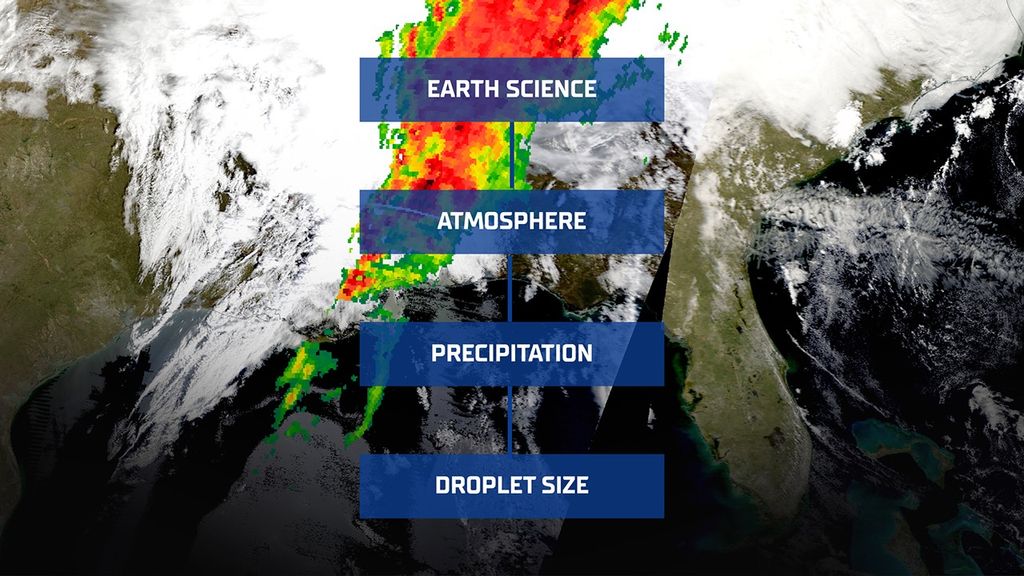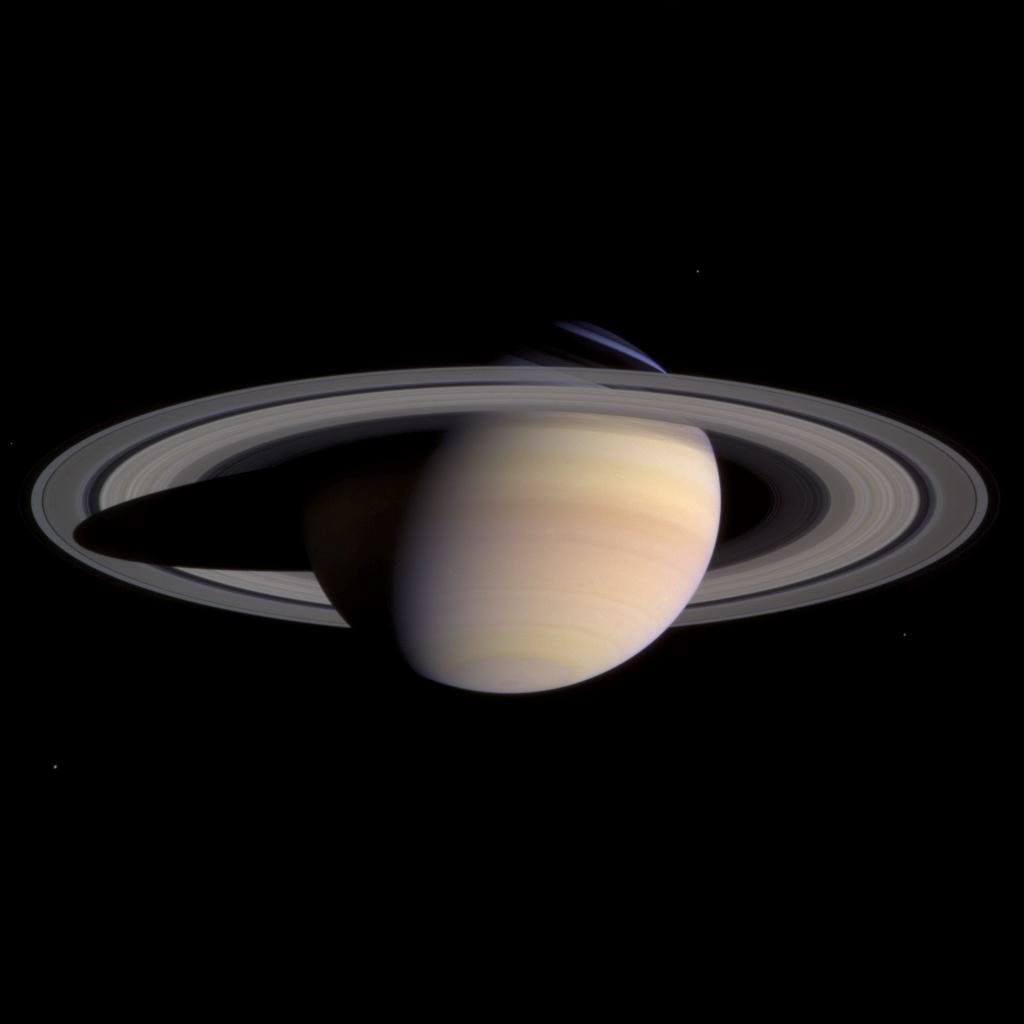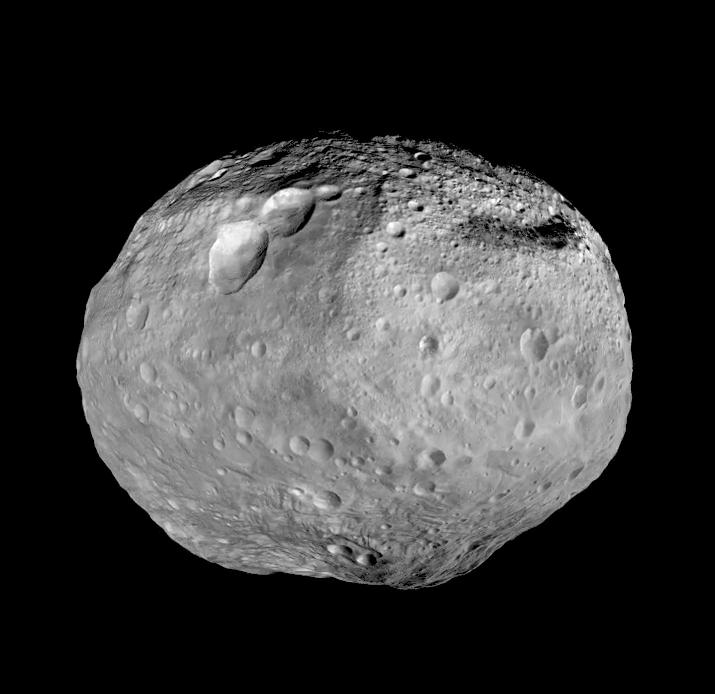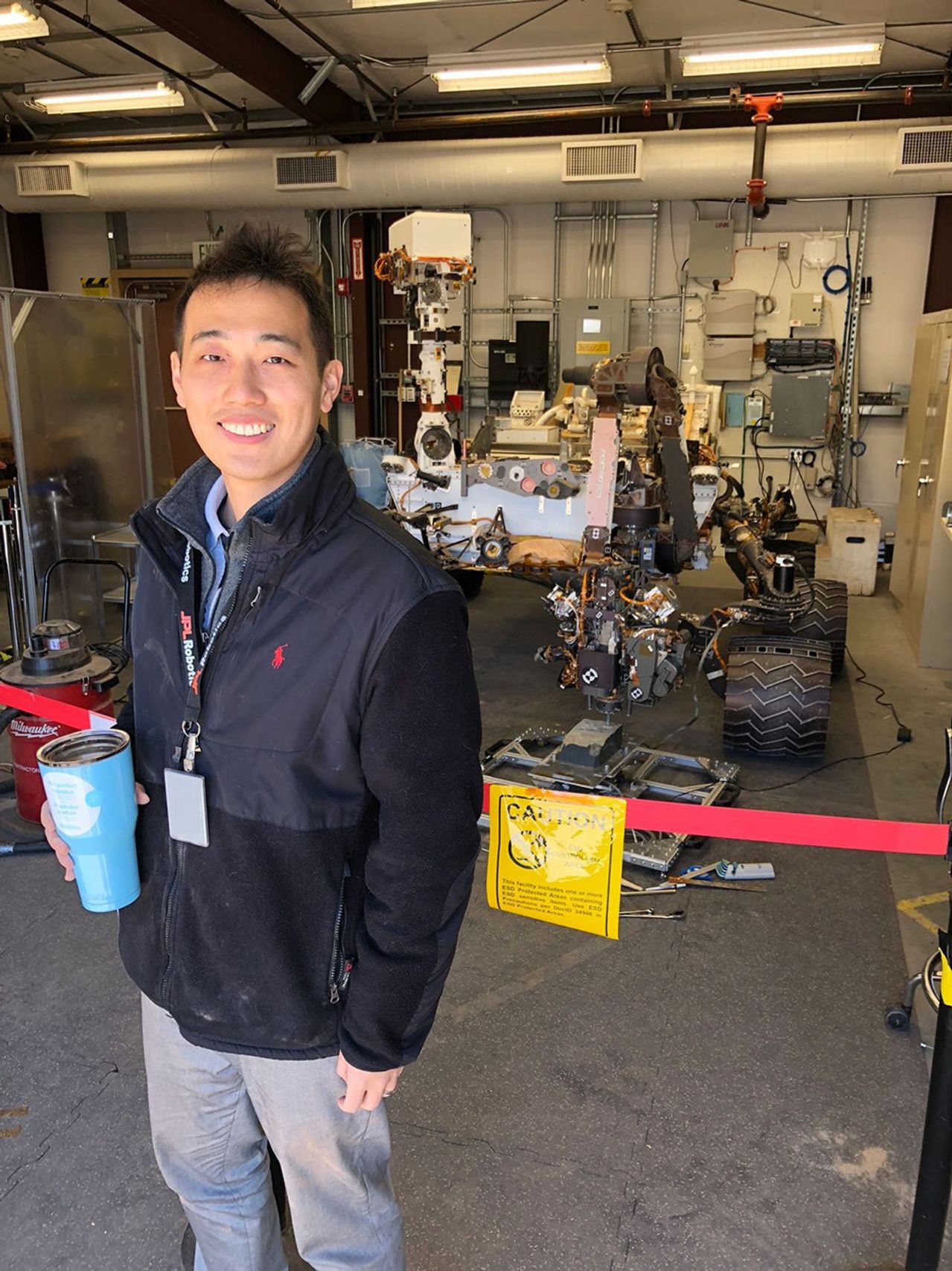
Philip Y Twu
Robotics System Engineer and Group Supervisor - NASA's Jet Propulsion Laboratory (JPL)
Contents
- Education
- What first sparked your interest in space and science?
- How did you end up working in the space program?
- Tell us about your job. What do you do?
- What's one piece of advice you would give to others interested in a similar career?
- What has been your biggest challenge, professional or personal, and how did you overcome it?
- Who inspires you?
- What have been some of your favorite projects to work on?
- What are some fun facts about yourself?
- What is your favorite space image and why?
- Additional Links
- Where are they from?
Education
University of Maryland, College Park, MD
Electrical Engineering
University of Maryland, College Park, MD
Computer Science
Georgia Institute of Technology, Atlanta, GA
Electrical and Computer Engineering
Johns Hopkins University, Baltimore, MD
Space Systems Engineering
What first sparked your interest in space and science?
My interest in space was sparked very early on as a kid while watching science fiction movies like “Contact” and “Close Encounters of the Third Kind” with my dad. Although neither of us knew much about space or science, we were both awestruck by the thought of what mysteries were waiting to be discovered in our vast universe. That fascination, and the desire to become an explorer of the unknown, stuck with me throughout my childhood and adolescence.
Unfortunately, due to a lack of exposure to career path options and role models in STEM [science, technology engineering, and math] fields, I never took up an interest in STEM during my K-12 education, nor did I understand its relevance to space exploration. In fact, although my parents emphasized mathematics during my K-12 education, I didn’t like the subject because it wasn’t clear to me what the math could be used for, and the people closest to me didn’t know either.
This mindset continued until I took introductory physics as a freshman in college. It was a life-changing experience. For the first time in my life, it was as if all the dots connected. Phenomena I encountered in everyday life could be explained through science, while mathematics was the tool with which we understand, predict and even find ways to make use of these phenomena to better our lives.
From that point onward, I fell in love with STEM, and soon afterward I realized that a STEM education was the key to my childhood dream of one day becoming an explorer of the unknown in our country’s space program.
How did you end up working in the space program?
My first job after graduation was at the Johns Hopkins University Applied Physics Laboratory, where I spent my first two and a half years working on projects not related to the space program.
Although I learned a lot from that experience and met a lot of amazing people, I always felt that space was where I truly belonged. I enrolled in space systems engineering graduate courses at the lab’s evening school and used that opportunity to develop a broad knowledge of space systems as well as network with people at the lab who worked on the space program. With the support of some truly extraordinary mentors and a can-do attitude for taking on any assignment thrown at me, my dream eventually came true – I officially transferred into the lab’s space exploration sector, where one of my initial assignments was to work on the fault management system for the Parker Solar Probe mission.
Tell us about your job. What do you do?
I work in the Mobility and Robotics Section at NASA’s Jet Propulsion Laboratory (JPL) as a robotics system engineer, and as group supervisor for the Robot Operations and V&V Group. Other jobs I’ve had include being the Guidance Navigation and Control (GNC) V&V Lead for the Psyche mission and Autonomy Architect for the Europa Lander pre-project.
However, the job that I’ve spent the most time on is being the systems engineer responsible for the Mars 2020 rover’s brand new autonomous navigation system, which allows it to self-drive at a much faster rate than previous rovers and navigate through much more complicated terrain.
The autonomous navigation system is comprised of hardware, software, and algorithms. My job is not to be an expert in any one particular area, but rather to maintain a broad knowledge as a coordinator who makes decisions and identifies issues that cut across multiple areas to ensure that the system as a whole will work.
I really enjoy this role, as it allows me to draw upon many different aspects of my STEM education on a daily basis, and to attain knowledge in new areas, as needed, for my job. Moreover, I like being able to interact with people from different disciplines and focus on the big-picture view of what we are all working toward.
The best part of my job is being able to witness the fruits of our labor whenever we see brand new Mars images and data collected by the rover that we worked so hard on.
What's one piece of advice you would give to others interested in a similar career?
Stay true to yourself and don’t let others dissuade you from chasing your dream. Throughout my journey, I’ve had many people close to me (including friends and family) tell me that a career in the space program was not realistic, and I naively believed them. I now know that although their advice came from a place of love, they were also projecting onto me their own fears related to failure, financial stress, job stability, etc.
For those of you who are on the edge, use me as an example that a stable and extremely rewarding career in the space program is a real thing. Every day, I think of all the people in the world who just go through the motions in life while working a job they don’t enjoy, and I feel so grateful that I get to spend my days doing something I love and believe so strongly in.
We only have so much time in this world to accomplish our life’s work. Follow your dreams and pursue a career that you are passionate about. If I can do it, then you can do it!
What has been your biggest challenge, professional or personal, and how did you overcome it?
My biggest challenge has not been purely professional or personal, but rather where the two intersect. I have a tendency to obsess over problems I’m working on, and I don’t want to do anything else until I’ve figured them out. While this level of focus is good in short bursts, it can be destructive over long durations, and it leads to neglecting other aspects of life, or even burnout.
A healthy life is a balanced life. Taking time to rest and practice self-care will allow you to go even further in the long run than if you constantly are powering through work. This concept may seem obvious, but it can also be easy to forget when you are in the midst of stress and looming deadlines.
I overcame this challenge by consciously making self-care a priority in life, scheduling time for exercise and adequate sleep, and treating them with as much seriousness as I would any other work meeting that is on my schedule. The missions we work on in the space program take place over very long time scales, and I want to live long enough to see my work through to the end. Remember: It’s a marathon, not a sprint.
Who inspires you?
I get inspired when I see how excited the general public is by the work we do. Whether it’s listening to people’s conversations at a museum or open house event, or even just reading comments on a NASA-related video posted online, it never ceases to amaze me how far-reaching our work is, and how many lives it touches.
For various reasons, not everyone can or chooses to be in the space program. However, the urge to explore the unknown is something that is fundamental and universal across humankind and we’ve been entrusted with carrying out that task. Our work transcends cultural, political, and social boundaries. When we succeed, the entire world celebrates.
What have been some of your favorite projects to work on?
My favorite projects so far have been working on the Mars 2020 and Parker Solar Probe flight missions. Flight missions are particularly exciting to me because I feel like I am on the front lines of exploration. Being an engineer, the actions I take and the decisions I make on a daily basis can contribute to the success or failure of the mission. Although the work can be stressful at times, it’s comforting and motivating to know that everyone else on the mission is also giving it their all as we work toward a common dream that is bigger than any of us individually.
What are some fun facts about yourself?
Outside of work, I am a lifelong martial arts practitioner. As a child, I studied Chinese wushu and taekwondo. In college, I spent some time learning boxing, and in graduate school, I trained in Jeet Kune Do, Filipino Kali, and Keysi Fighting Method. In recent years, I’ve focused my training on Muay Thai and Brazilian Jiu-Jitsu.
Although the techniques and philosophies of these martial arts may differ, they all play key roles in developing and maintaining the same important traits in my character that have benefited me in life and career: confidence, courage, perseverance, and – most important of all – humility.
I also enjoy visiting national parks to witness the awe-inspiring beauty and grand scale of nature. My most recent trip was to Zion National Park in Utah. Finally, I love visiting observatories to see how others are following their space exploration dreams in different ways than me. The coolest observatory I’ve visited was the Green Bank Telescope located in the National Radio Quiet Zone of West Virginia, where many of the radio signal searches for the Breakthrough Listen SETI project are conducted.
What is your favorite space image and why?
My favorite image is one of Europa, one of Jupiter’s moons. Like other icy moons in our solar system, there’s evidence to suggest that Europa may have a subsurface ocean containing the essential ingredients needed for life.
The search for life beyond Earth is the primary dream that drives me in my work. I want to seek answers to the big questions like ‘What’s out there in the universe?’ and ‘Why are we here?’
Europa represents a realistic goal to work toward answering those questions in our lifetime, and it is a perfect example of the allure of exploration. It is located in an accessible part of our solar system, and yet the answers we seek are just out of our reach due to the moon being encased in a thick, icy, outer shell.
One of the goals I hope to achieve in my career is to be on the mission that finally breaks through Europa’s ice and discovers what mysteries are hidden within.
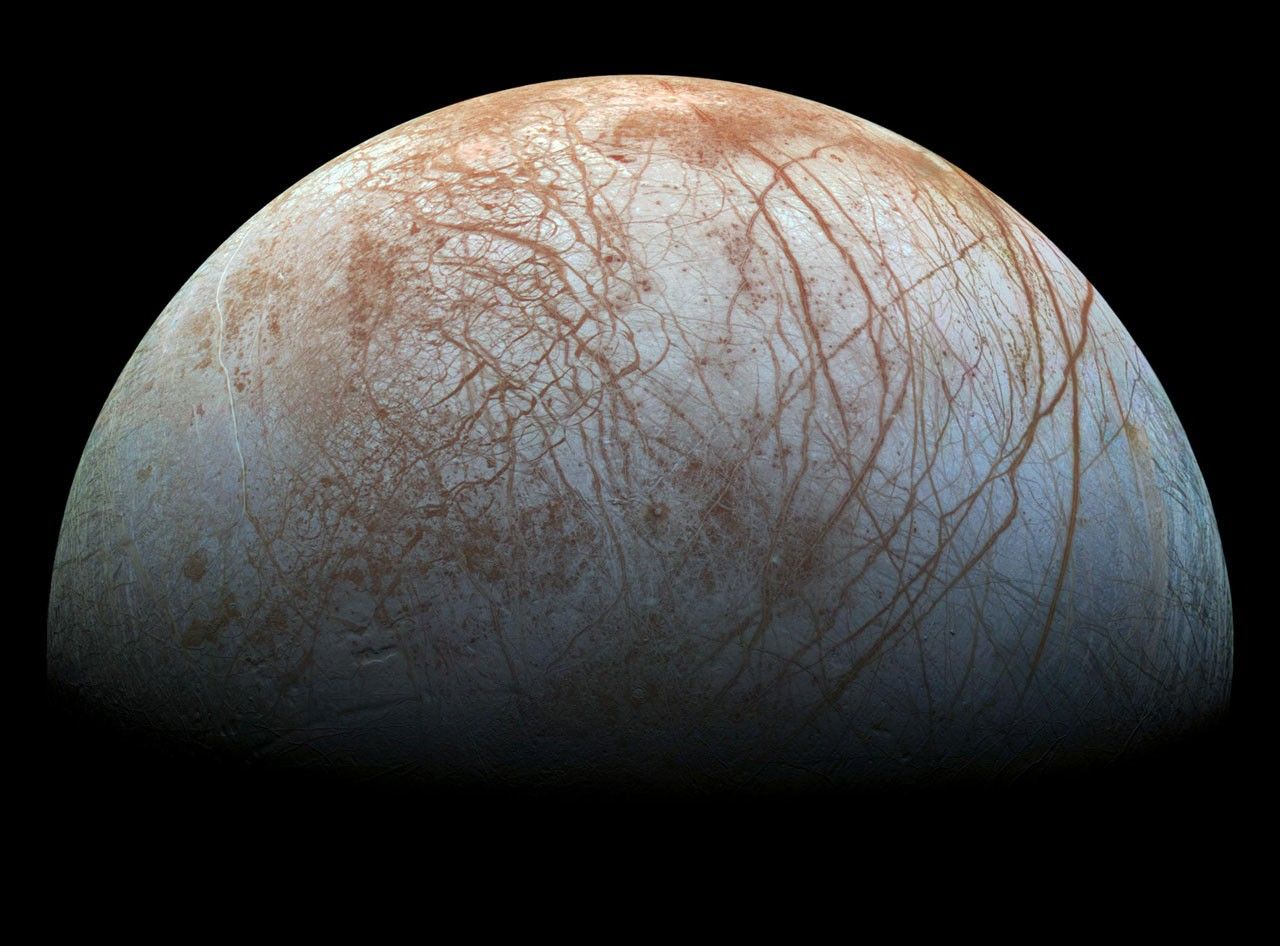
Additional Links
Maryland Robotics Center: Alumnus Philip Twu’s exciting career in space robotics
Where are they from?
Planetary science is a global profession.













